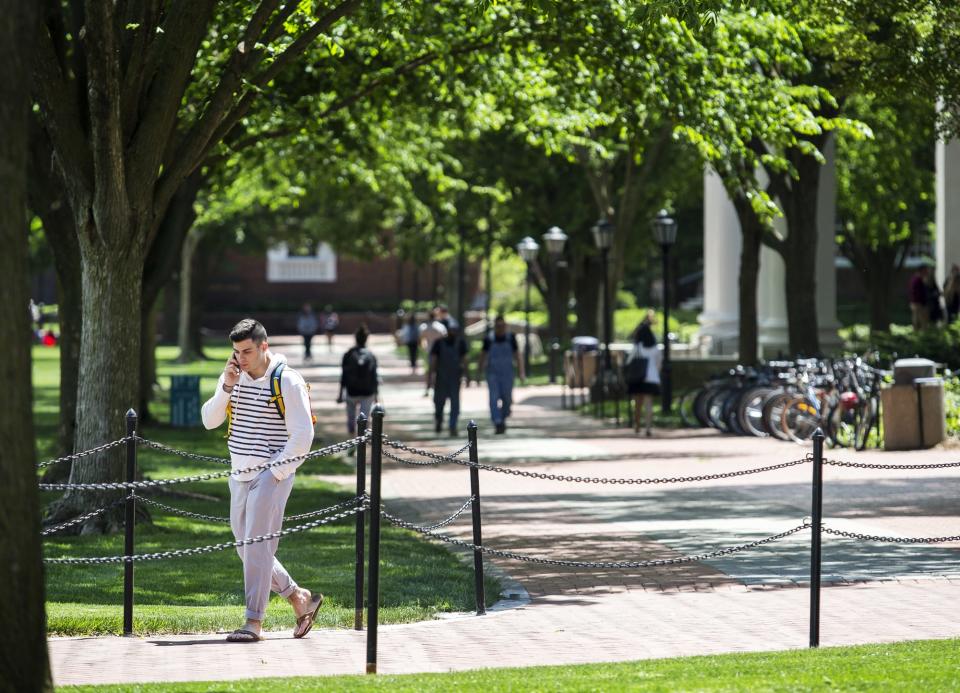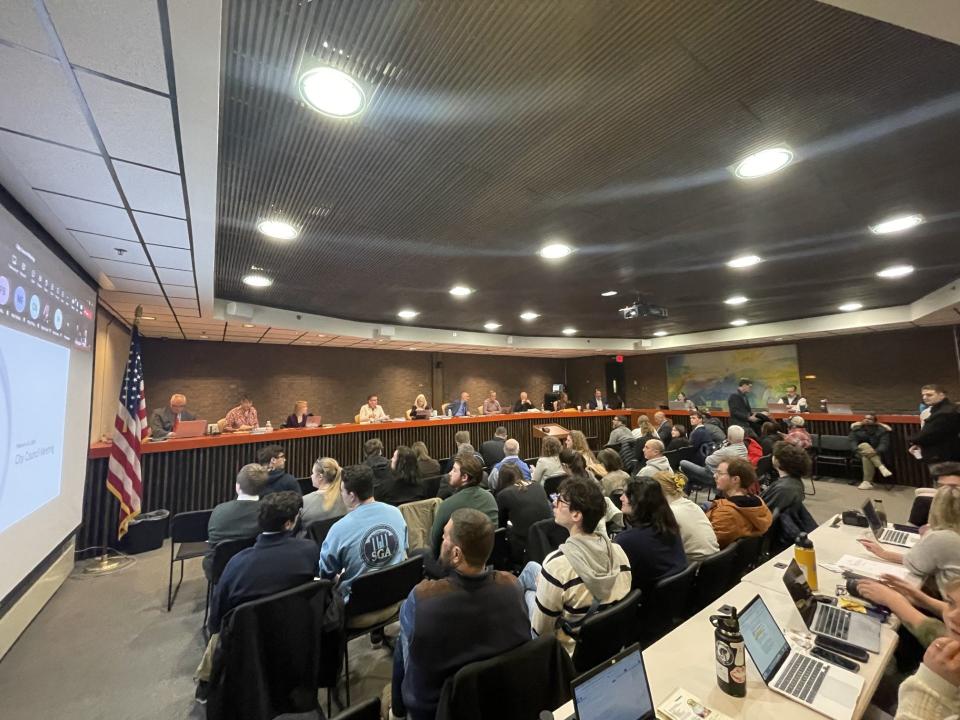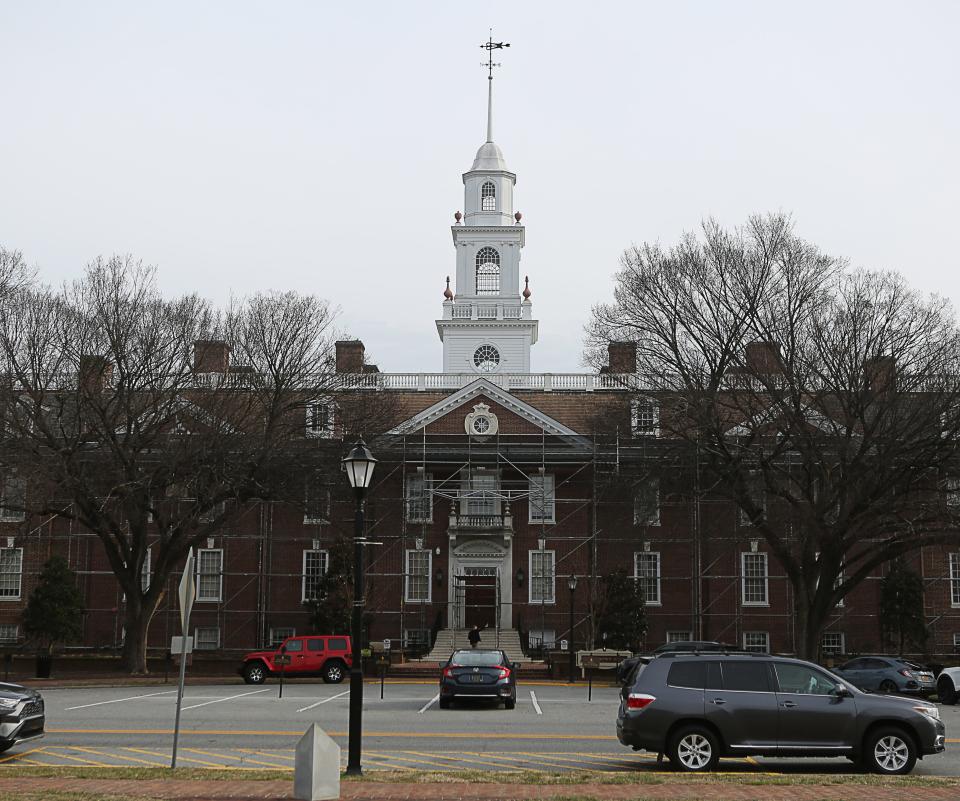City of Newark moves forward on new UD student tax, looks to state for support
Newark says it's time for the University of Delaware to pay its fair share.
Students packed into the council chambers Monday evening — some in bonus seating, others viewing the remote-meeting stream, some 3,700 signing a petition — to tell the City Council they felt differently. The council considered its resolution, seeking a "per student tax" from the state's largest university to increase city revenue, after well over two-and-half hours of discussion and public comment.
That's "up to $50 per semester, per full- or part-time undergraduate or postgraduate student, at any college or university" attending in-person, the resolution reads, with that fee adjusting with inflation. So $100 a year at the largest amount, aiming for some $2 million in annual impact for the city depending on UD enrollment. The council postponed another proposed tax, on rental lease revenues.
Many student speakers pressed that the city shouldn't place this financial burden ultimately on young adults getting an education. Residents and a string of others speaking in favor of the measure reminded onlookers it's just a tax on their university, which maintains tax-exempt property worth some $6 million a year within city limits.
The council said yes to the move, unanimously. Now, Newark must appeal to the state Legislature to approve a charter amendment, actually allowing the city to levy a new tax.
It expects to find support.
What's behind the legislation?

Newark says about 42% of real estate within the city is tax-exempt.
That's because the University of Delaware, like all nonprofits under state law, doesn't pay property taxes. If it did, the city estimates they would total around $6 million. It does pay operating costs to the city, like water and electricity, as well as certain fixed payments in lieu of taxes — but the council says such "PILOT" payments haven't been adjusted in nearly 60 years, despite the school quadrupling in enrollment.
Also, UD uses a credit card for millions in utilities and these payments — like $120,000 in PILOTs and $60,000 for police support — according to City Manager Tom Coleman. So, the city must face roughly $400,000 in overall processing fees each year.
And still, "students that attend the University of Delaware rely on the city to provide services that are financially supported by property tax revenue like police services and road maintenance," the resolution reads. It contends that additional revenue sources are "imperative" to continuing to provide city services. The city says it's staring at a widening budget deficit, and an unstable path forward with inflation and rising labor costs.
This isn't a new idea, either.
This tension has existed for decades, and the council discussed this very concept after a 13% increase in property taxes spurred the common complaint for residents in 2019. Discussions renewed in pitch as city residents will see their property taxes go up for a third straight year.
"Last year, we raised the tax on the constituency to be able to afford these amenities for you," said Councilwoman Dwendolyn Creecy, stressing she doesn't see this measure as taxing students. "If we had to raise taxes on our constituency, what is wrong with being fair and having a small fee that is a collective bill for the University of Delaware to play their part?"
Ahead of the meeting, Coleman agreed one could debate on whom the burden will ultimately fall. But, he said, "I think the more important discussion to have is: What is the value that the city provides to the university, and is the university compensating the city?"
Discussion continues in Newark

City officials assert UD has not been open to negotiation, on this issue at large, on longstanding requests to no longer submit payments via credit card and more.
UD's Executive Vice President and Chief Operating Officer John Long spoke Monday night, alongside Caitlin Olsen, the school's director of government relations, and few other university voices. Both officials said they were surprised to hear of the tax resolution, given other financial impact the university brings to town.
"Using our students as a vehicle for tax increases is an affront to all that our relationship stands for," Olsen said. "Newark is a place that should cultivate opportunity and appreciation for all that the next generation coming forward."
In council chambers, student leaders also spoke to the charged quorum.
UD bracing for other costs: Hiring frozen. Projects paused. Travel curbed. UD reacts to spiking state health care cost
"I want to express that we the students are grateful for the city network and the services it provides, as well as the support of this council. However, we do not reap the rewards of the city without providing substantial contributions ourselves," said Julia Hatoum, student body president, having captured the thoughts of many students speaking Monday night. "And while the University of Delaware may not provide the additional revenue stream you seek, the institution and its students are major players in the city's economy and well-being."
She told the council that many students are already strapped, and thousands signed her Cabinet's petition to oppose a tax that "would necessitate" UD charging students more.
The university already implemented its largest increase in a decade ahead of this year, largely due to inflation impact. That boost brought annual costs for most undergraduates living on campus to $31,256 for Delawareans and $54,896 for nonresidents.
Regardless, the council moved forward.
Members deliberated the initial resolution, tightening language to indicate the measure would count just the fall and spring semesters. And in step with his fellow council members, Jason Lawhorn called it "a reasonable solution for a difficult problem."
"I understand it's another challenge," he continued, noting hurdles universities are facing. "I would expect them to pass it on to you, so I understand why you're all here."
Many council members suggested students turn their activism on their own university, as well.
ICYMI: Climate protesters who entered Biden campaign headquarters arrested Monday
So what's next?

This governing body knew an enrollment tax would be a political lift. Now, it will look to state lawmakers.
"If we hope to implement either tax early enough for it to be budget relevant for the 2025 budget year, we will need the state legislature to pass a charter amendment this legislative session," Newark's city manager wrote to the mayor and council last week. "Based on the remaining legislative calendar, that means we must act fast."
Coleman said he started discussions with local representatives before proposing the measure. He hopes conversations can lead to a legislator sponsoring this as a bill to amend Newark's charter. And at least one lawmaker was in attendance Monday.
In brief comments before the meeting started, state Rep. Cyndie Romer, D-Newark, showed openness to the proposed measure, though she was there to listen. The Blue Hen with a child at UD said there are "a lot of misconceptions" with the bill, but it's really about support.
If brought to Legislative Hall, it must pass in both houses and head to the governor's desk. Then, if signed into law, Newark would have the authority to consider a new tax on its university neighbor.
When asked whether he fears this would forever change the city's relationship with the university, Coleman said, "It certainly could."
"I don't doubt that," he continued. "But another thing that could change the way we interact with university is a significant scale back in the services the city can provide."
Got a story? Contact Kelly Powers at kepowers@gannett.com or (231) 622-2191, and follow her on Twitter @kpowers01.
This article originally appeared on Delaware News Journal: City of Newark moves forward on new University of Delaware student tax

